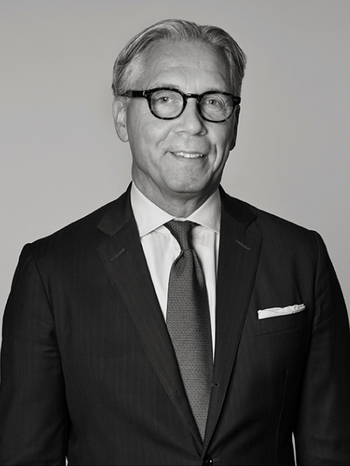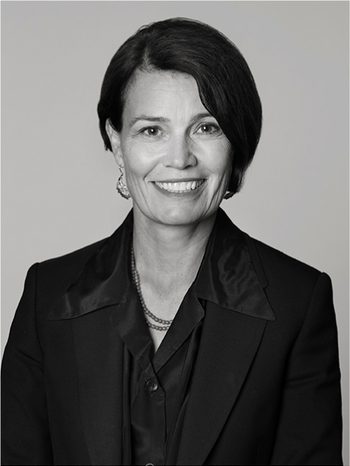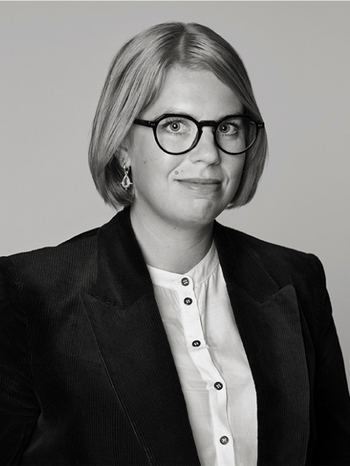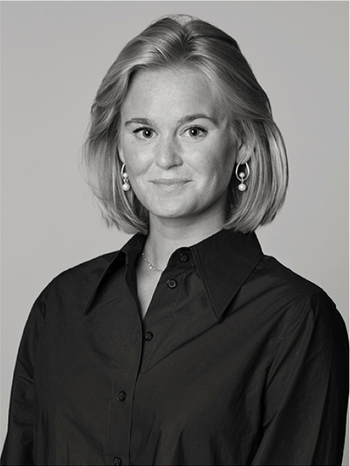Important works by Lennart Rodhe at Modern Art & Design
Lennart Rodhe
'Snurran'
Lennart Rodhe's visit to Paris in the fall of 1947 was an important experience. After the confines of the war years, Rodhe was drawn to travel across Europe, and his journey began in Paris. Accompanied by his then-wife Eivor Burbeck, they spent several weeks visiting museums, galleries, and fellow Swedish artists, including Lage Lindell. Rodhe had a commission from Bonniers förlag for a book cover for "Den ointresserade mördaren" by Tord Herne. He found inspiration for the cover in Paris when he came across a folder of reproductions by the avant-garde photographer Germaine Krull. The folder titled "Metal" from 1928 contained 64 images of robust metal constructions such as cranes, bridges, railways, and power stations captured in close-ups or from breathtaking camera angles. The photograph of the Eiffel Tower taken from below left a strong impression on Rodhe, inspiring the book cover for Bonniers and marking the beginning of a new direction in his art, centered around the theme of triangles.
During the summer of 1948, Rodhe worked on depicting space and movement using only the simplest of geometric shapes, the triangle. When using triangles exclusively, the spatial depth of the image often remained shallower than desired. Through contrasting colors, a certain depth could be created, but it was challenging to create an illusion of movement in the picture. A triangle seen from the side remains a triangle, just slightly narrower, and it stays on the surface of the image. By incorporating ellipses into the triangles, as in 'Snurran,' an optical impression of movement in the picture was created. The eye perceives the ellipse as a circle, tilted diagonally, causing the triangles to appear to move in different directions.

› Signed with monogram and dated -48. Also signed and dated verso Lennart Rodhe 1948. Tempera on panel 101 x 121 cm.
The first sketch for "Snurran" is dated December 4, 1947. It was made on black Ingres paper with tempera white and ink (see image from exhibition invitation card, Ny Realitet. Östersund 1949). Through repetition and coloration, Rodhe achieved perspective and depth, but he did not apply principles mechanically. An odd shape could disrupt the order and lead to an entirely different outcome. A new color could enter entirely without justification, without being part of a larger context.
Rodhe was the first among his peers to receive major commissions. From 1948 to 1953, he worked on the "Trappan" theme for Ängby School, and from 1948 to 1952, he worked on "Paket i långa banor" for the post office in Östersund. The initial sketches for "Trappan," executed on cardboard and mounted on the wall, included both "Drakar" and "Snurran," two motifs found in this auction (see photo). In the final version of "Trappan" for the drawing room in Ängbyskolan, the spiral form of the staircase took up more space, and the strict form varied across the entire wall surface.
The initial public commissions were followed by more, such as Astra's dining hall in Södertälje, stained glass windows for Svenska Handelsbanken, stoneware walls for Dagens Nyheter, textiles for the National Archives and the Riksbank, among others, and two large carpets for Thielska Galleriet. Lennart Rodhe dedicated much of his artistic life to monumental tasks. He dreamed that monumental works would be everyone's property and could be viewed and judged by as many people as possible. He was greatly disappointed that public art was not always preserved for the future. Some of Lennart Rodhe's public works can no longer be seen.
Estimate 1 200 000 - 1 600 000 SEK
To the work

'Drakar III'
During the summer of 1948, Rodhe worked on capturing space and movement by solely relying on the simplest of all geometric shapes, the triangle. When using triangles exclusively, the spatial depth of the image often remained shallower than desired. Through contrasting colors, some depth could be created, but creating an illusion of movement in the picture proved challenging. A triangle seen from the side remains a triangle, just slightly narrower, and it remains fixed on the surface of the image. By incorporating ellipses into the triangles, as seen in the work 'Snurran' (presented in this auction), an optical impression of movement in the image was created. The eye perceives the ellipse as a circle, tilted diagonally, causing the triangles to appear to move in different directions.
Through repetition and coloration, Rodhe achieved perspective and depth, but he did not mechanically apply any principles. An odd shape could disrupt the order and lead to an entirely different outcome. A new color could enter without justification, without being part of a larger context.
Thomas Millroth described the creation of the two motifs "Snurran and Draken" in the SAK publication of 1989:
"After the theme of the Eiffel Tower, Rodhe began to refine the triangles. The first sketch for "Snurran" is dated December 4, 1947. It was made on black Ingres paper with tempera white and ink, typical of an artist with such an eye for the significance of intervals... While creating movement and variations between forms, the picture must be perceived as a whole. In "Draken," this is complicated by the surface consisting of a mosaic of triangles, which, in terms of color and value, are arranged in such a way that the elliptical forms set them in motion. At the same time, the triangles change position, but always maintain contact with the surface of the picture, either through the tip or one side."
The dynamism of the triangle paintings contained a strong circulating movement, which also penetrated into and out of the picture, revolving around a center. The same kind of energy would soon also appear in contemporary urban planning. There are, for example, clear parallels between Rodhe's "Draken" and the modern center of Vällingby inaugurated six years later. From an aerial perspective, the movement of building structures and roads can be seen towards and away from the suburban center. But while the vitality of urban planning has waned since then, the paintings retain their strong kinetic energy unscathed.
Rodhe was the first among his peers to receive major commissions. From 1948 to 1953, he worked on the theme of "The Stairs" for Ängby School, and from 1948 to 1952, he worked on "Packages in Long Rows" for the post office in Östersund. The initial sketches for "The Stairs," executed on cardboard and mounted on the wall, included both "Draken" and "Snurran" (see photo). In the final version of "The Stairs" for the drawing room at Ängbyskolan, the spiral form of the staircase took up more space, and the strict form was varied across the entire wall surface.
Estimate 1 000 000 - 1 500 000 SEK
To the work

The initial public commissions were followed by more, such as Astra's dining hall in Södertälje, stained glass windows for Svenska Handelsbanken, stoneware walls for Dagens Nyheter, textiles for the National Archives and the Riksbank, among others, and two large carpets for Thielska Galleriet. Lennart Rodhe devoted a significant portion of his artistic life to monumental tasks. He dreamed that monumental works would belong to everyone and could be viewed and judged by as many people as possible. He was greatly disappointed that public art was not always preserved for the future. Some of Lennart Rodhe's public works can no longer be seen.
The works will be sold at Modern Art & Design
Viewing: May 16 – 20, Bukowskis, Berzelii Park 1, Stockholm
Open: weekdays 11 am – 6 pm, weekends 11 am – 4 pm
Live auction: May 21– 22, Arsenalsgatan 2, Stockholm
Read more about Modern Art & Design and see the full catalogue

› Wall painting in Ängby School (in the first version on cardboard, both "Draken" and "Snurran" are included). Photo: Sune Sundahl, 1948.
Requests & condition reports Contact specialist

Tukholma
Andreas Rydén
Varatoimitusjohtaja, Johtava asiantuntija, taide
+46 (0)728 58 71 39

Tukholma
Lena Rydén
Johtava taideasiantuntija, moderni- ja 1800-luvun taide
+46 (0)707 78 35 71

Tukholma
Amanda Wahrgren
Asiantuntija, moderni taite ja grafiikka
+46 (0)702 53 14 89





























